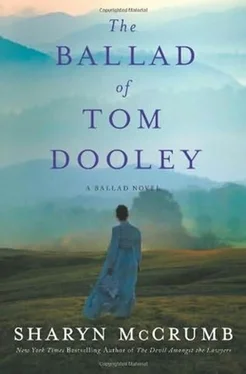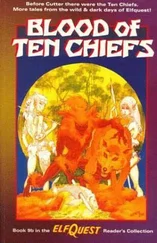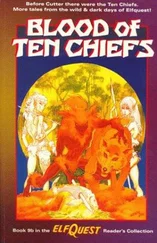“I’ll be awful tired tomorrow, Ann. You know I ain’t well to begin with. I don’t know… to make a long walk over to German’s Hill, and then to have to walk all the way back here, and get up at the crack of dawn and cook breakfast…”
Ann stuck out her lip. “I suppose I could give you a hand with the morning chores, then. But you had better find out something worth telling when you get there, Pauline. If you go over to Wilson Foster’s and spend the evening getting drunk and sleeping it off instead of talking to Laura and coming on back, I’ll take a switch to you. I swear I will.”
***
I got the half day off, all right. I never once heard James Melton tell his wife “no” about anything. Maybe he was scared to, but I don’t reckon he could have been worried about rat poison in his food, for I never saw Ann do that much cooking. So off I went on that next afternoon, while Melton tilled the field alone, with his two milch cows yoked to the plow. I hated to wear out shoe leather trudging through the muddy trace to German’s Hill, when I could have got there in an hour or so on horseback, but if James Melton could not afford even a scrub horse, at least he could cobble me a new pair of shoes.
The walk was pleasant enough in the late afternoon, but I decided to stay the night, for spring nights are still bone-chilling cold, and I had no desire to make my way home on foot close to midnight in that weather, especially since this visit was being done as a favor to Ann, and I was disposed to inconvenience myself as little as possible on her account. Why is it that fine-looking folk always think they are doing you a favor by letting you do them one?
We still weren’t far enough into spring for there to be much to see on my way to the Fosters’ place-a few green leaves on trees here and there, and sprouts of grass amid the mire of rain-soaked fields. The road ran along beside the river, and it was as brown as the fields from the spring rains. I thought it looked like a trail of tobacco spit, not at all like the clear little streams we have up the mountain in Watauga County. I am not much moved by the beauty of nature anyhow, because every place I’ve ever seen looks about the same. I hoped that the Fosters would have something decent to eat and that they’d offer me some of it, and even more I hoped that there would be a full jug of whiskey and not too many people around to share it with. Whiskey is better than scenery. Better than people, too. It doesn’t ask you for anything in return.
I never paid much attention to the begats in our family, but as near as I could figure it, Wilson Foster’s daddy had been a brother to my grandfather, so we were cousins, same as I was with Ann’s mama Lotty Foster. Prosperity did not seem to run in the Wilkes County branch of the family, for Wilson was not much better off than Ann’s family. He farmed in German’s Hill, but he didn’t own the land, just worked as a tenant, so he barely cleared enough from farming to feed his family. Laura was the oldest, of an age with Ann and me, and after her came three boys and a baby girl. Their mama was dead, though, probably birthing that last child, though I hadn’t bothered to ask the particulars of it. What cooking and cleaning was done about the place fell to Laura, for there was no money to pay a servant.
It was a dingy white frame house that didn’t look big enough to house six people, but I suppose that the little ones all slept piled together somewhere like puppies. It looked like a house that nobody cared about-not Wilson Foster, because he was too shiftless to own it, and not his landlord, because he probably figured that a ramshackle place with a leaky roof was good enough for a tenant farmer’s family.
I didn’t feel sorry for them, though. They had a roof over their heads, and a woods full of game to put meat on the table, and they had lived through the War. There’s many that had to make do with less than that. Besides, the Fosters were not what you would call a close family. We didn’t think we owed anything to one another, and we didn’t flock together like guinea fowl, preferring our own company to the outside world. Look at Cousin Ann. She didn’t take me in out of the kindness of her heart. She let me stay so that she could have a servant for next to nothing. If that is family feeling, you can have my share of it.
***
I sat looking at the house for a minute, before I approached the door. Before I could hello the house, one of the boys came around from the side of the house, and stood a few feet away from me, staring. I made sure he didn’t have a rock in his hand, and then I bade him a good evening, but he just glanced at me wall-eyed, and gave me the barest nod to acknowledge my greeting. Shy around strangers, I thought, and I left him be, and walked on up to the house, wearing a plaster smile, and ready to be the long-lost cousin from the mountains, if that’s who they needed me to be.
At first nobody answered my knock, but inside I could hear a child hollering, “Somebody’s come a-calling.”
I waited, because there’s no use in rapping again if they know you are there. By and by, the door opened enough for a small head to peek up at me, and a big-eyed boy stared at me for a moment or two, before he said, “What?”
I gave him a careful smile. “It is all right,” I said. “I am kin to you. Which Foster boy are you? James?”
He shook his head. “Naw. I’m John. It was Elbert what brung you up to the door.” That got him talking, which is why I pretended to think he was James, who is seventeen. This sorry little pup couldn’t have been twelve yet. I knew that the best way to get some folks to talk is to let them correct you. After that, he forgot to be bashful, and I edged past him and headed straight for the fireplace, for it had been a cold walk from the Meltons’ place to German’s Hill. While I warmed my hands, I glanced around, seeing exactly what I had expected to see: a few sticks of homemade pine furniture, a rag rug on the floor, and some pans and a cast-iron skillet hanging from hooks in the ceiling.
Nobody ever got rich being a tenant farmer, and Wilson Foster was proof of it. After a minute or two my eyes got adjusted to the dim light, and I spied my cousin Laura over next to a cradle, holding a lap-baby in her arms. This must be the youngest of the brood, the one that their mother had probably died giving birth to. That, too, was a commonplace, among poor folk. The women just keep spitting out babies, and wearing themselves out with tending to the brood and doing all the farm chores, until finally one day they birth one baby too many, and die trying. Most men managed to get through at least two wives in a lifetime. The wonder of it was that any woman was ever fool enough to walk into that trap, but most all of them did, sooner or later. I supposed that my cousin Laura would, too, if she ever got the chance, though one baby seemed the same as another to me, and since she had one to tend to as it was, why would she go off to saddle herself with another one?
She was a little thing, Laura was. The top of her head wasn’t much higher than a broom handle, and I’ve seen gourds bigger around than her waist. She had mousy brown hair, and good cheekbones in a heart-shaped face, but she wasn’t a patch on Ann, for looks or brains.
When my feet and hands stopped tingling, I left the hearth and went over to the cradle, where Laura was. She had got the baby to sleep now, and she set it down in its old rag quilt, laying a bony finger to her lips to warn me not to wake it with any loud talking. I needed no cautions on that score. The last thing I wanted was to have my visit marred by the bawling of a smelly young’un.
I nodded to Laura to show her that I understood the warning, and pointed for her to come back over to the hearth. We dragged a couple of pine stools up close to the fire, and put our heads together to talk in low voices. I didn’t see Wilson Foster anywhere about, and I reckoned he had not come in from the fields yet, which was fine with me, for I had not come all that way to suffer through idle chit-chat.
Читать дальше












